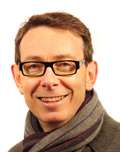Steven Yearley
| Steven Yearley | |
|---|---|
 Professor Steven Yearley | |
| Born |
1956 Walthamstow, North East London, UK |
| Died | 6 September 1956 |
| Occupation | Sociologist |
| Known for | ESRC Genomics Policy and Research Forum |
Steve Yearley (born 6 September 1956),[1] is a British sociologist, Professor of the Sociology of Scientific Knowledge at the University of Edinburgh, a post he has held since 2005. He is seconded from the sociology unit to be Director of the ESRC Genomics Policy and Research Forum, more often known as the Genomics Forum. He has been designated a Fellow of the Royal Society of Edinburgh.
Career
Yearley first studied natural sciences and then social and political sciences at Cambridge University. He completed a PhD in sociology, supervised by Michael Mulkay, at the University of York from 1978 to 1981. Due to the scarcity of sociology jobs in the UK in the early 1980s, Yearley had a couple of short-term positions before he got a lectureship in sociology at Queen's University Belfast in 1983. It was in Belfast that he began to concentrate on environmental issues and in the late 1980s and early 1990s he was closely associated with Friends of the Earth, the Ulster Wildlife Trust and Northern Ireland Environment Link.
He became the first Professor of Sociology at the University of Ulster in 1992, returning to Queen’s for a short stint as Professor there in 1994, and then moving to the sociology professorship at the University of York in 1995. He worked in York from 1995 to 2005, spending his last six years there as Head of Department; in York he worked closely with colleagues in the Stockholm Environment Institute. Yearley has also spent periods as Visiting Professor in Science and Technology Studies at Cornell University, at the Technical University of Denmark and at the University of Melbourne.
Since 2006, Yearley has worked primarily as director of the Genomics Forum, a research institute funded by the ESRC and aimed at linking social research on life-science issues with a variety of audiences beyond the social sciences. In this role he has collaborated with among others the Human Genetics Commission, Citizens' Inquiry into the Forensic Use of Genetic Information, the National Natural Science Foundation of China, the Scottish Government's Health and Wellbeing Directorate and the Edinburgh International Book Festival. At the Forum, he focuses primarily on environmental aspects of the life sciences (such as issues around synthetic biology) and on new ventures in public engagement with the science and technologies of genomics. The Forum has hosted events including short story and poetry competitions related to genomics.[2]
In 2010, Yearley was elected Fellow of the Royal Society of Edinburgh.[3] Yearley is on the editorial boards of the journals Social Studies of Science and Nature and Culture.[4][5] With Steve Bruce, Yearley co-edited The SAGE Dictionary of Sociology. In 2005, he wrote Making Sense of Science: Understanding the Social Study of Science. In a review of that book for the Graduate Journal of Social Science, Yew Jin Lee wrote, "Overall this book is informative... akin to a tasty, well-prepared appetizer that prepares the way for more substantial courses to follow once the reader is prepared to do so."[6]
Yearley is known chiefly for three kinds of work within this field: theoretical analysis of trends within the sociology of scientific knowledge, the application of arguments from the sociology of scientific knowledge to environmental issues and to the understanding of environmental controversies and campaigning, and work that demonstrated how public participation in the evaluation of environmental modelling could lead to refinement and better uptake of the models.
Selected publications
Books
- Yearley, Steven (1984). Science and sociological practice. Milton Keynes: Open University Press. ISBN 9780335105816.
- Yearley, Steven (1988). Science, technology, and social change. London Boston: Unwin Hyman. ISBN 9780043012598.
- Yearley, Steven; Varcoe, Ian; McNeil, Maureen (1990). Deciphering science and technology: the social relations of expertise. Houndmills, Basingstoke, Hampshire: Macmillan. ISBN 9780333465554.
- Yearley, Steven; Varcoe, Ian; McNeil, Maureen (1990). The new reproductive technologies. New York: St. Martin's Press. ISBN 9780312035990.
- Yearley, Steven (1992). The green case: a sociology of environmental issues, arguments and politics. London New York: Routledge. ISBN 9780415083812.
- Yearley, Steven; Baker, Susan; Milton, Kay (1994). Protecting the periphery: environmental policy in peripheral regions of the European Union. Ilford: Frank Cass. ISBN 9780714645841.
- Yearley, Steven (1996). Sociology, environmentalism, globalization reinventing the globe. London Thousand Oaks California: Sage. ISBN 9780803975170.
- Yearley, Steven (2005). Making sense of science: understanding the social study of science. London: Sage. ISBN 9781412933896.
- Yearley, Steven (2005). Cultures of environmentalism: empirical studies in environmental sociology. Houndmills, Basingstoke, Hampshire New York: Palgrave Macmillan. ISBN 9781403901200.
Chapters in books
- Yearley, Steven; Collins, Harry M. (1992), "Epistemological chicken", in Pickering, Andrew, Science as practice and culture, Chicago: University of Chicago Press, pp. 301–326, ISBN 9780226668017.
- Yearley, Steven (1992), "Environmental challenges", in Hall, Stuart; Held, David; McGrew, Anthony, Modernity and its futures, Cambridge: Polity Press in association with the Open University, pp. 117–168, ISBN 9780745609669.
References
- ↑ "Yearley, Steven". Library of Congress. Retrieved 15 February 2015.
data sheet (b. 9/6/56)
- ↑ Cunnane, Sarah (August 26, 2010). "Forum calls on lovers of verse to find muse in genomics". Times Higher Education. Retrieved September 7, 2014.
- ↑ "RSE Fellows" (PDF). Royal Society of Edinburgh. Retrieved September 7, 2014.
- ↑ "Social Studies of Science". Sage Publications. Retrieved September 7, 2014.
- ↑ "Editorial Board: Nature and Culture". Berghahn Books. Retrieved September 7, 2014.
- ↑ Lee, Yew-Jin (2006). "Making Sense of Science (review)" (PDF). Graduate Journal of Social Science. 3 (1): 108–112. Retrieved September 7, 2014.